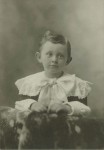A Civil War Story
This is another vignette from my grandfather’s memory. Lyle M. Denman (my grandfather) was 89 or 90 at the time my mother interviewed him for these stories. It turns out that his memory was pretty good but not perfect (surprised?) which I know because a typed copy of a Civil War journal written by Grandpa Minor (Charles E. Minor) turned up in the family, to which Lyle added a couple of pages to back in 1969 when he was only about 73. He gave details to some of these stories and remembered a little more than he did in 1985-86.

The stories I am posting now are from the interviews and I haven’t edited them for additional information from the earlier material. I may expand them in the future. Anyway, this is one of Grandpa Minor’s stories about being in the Civil War as told to the young boy, Lyle (picture to the right).
“At the time of the Civil War, President Lincoln called for 90-day volunteers. Many of the young men around Wakeman volunteered for the 90 days. And when the 90 days were up, a lot of them returned home. And my grandfather, in great disgust, always talked of them as the 90-day gang. He had very little sympathy or cared very little to mingle with those. He reenlisted for the duration and he stayed on until the, until the war was concluded. And then, following the surrender at Appomattox, instead of asking for a discharge to go home, he volunteered to stay on one year more as an officer to receive, to swear in the Confederates, the people who had seceded had to swear in and be registered as residents of the United States again — because they had seceded from the Union. And he spent one year at, I think it was Falls Church, Virginia, was his headquarters there. And all together, he put in a little over five years for the government at that time.
Now among the one or two little experiences he had. He had been wounded one time and he had been in the hospital. He was wounded five times. But one of the times, he had been in the hospital and he was pretty weak but it was a nice day, in April I believe he said. The weather was pretty nice but he had no overcoat and he went to the quartermaster and got a new overcoat. And it was a little bit chilly and he wanted — the field hospital was located some distance back of the firing line. He was an artilleryman and he made his way up to the field artillery was being fired.

The infantry was all ahead of them, down in the flats, and they were firing over the head of the infantry on the members of the South — as he termed them, as they called them, the rebels. And he noticed that they were having a problem and he walked over and talked with the commanding officer there and told them that he was an officer in the field artillery and could he be of any help. And he took his overcoat off and folded it carefully and set it on the ground at the base of a tree, because it had warmed up — and was over talking with this field artilleryman when, all of a sudden, come bouncing across the field, a cannonball came across the field, hit the overcoat that was folded up and ripped it to pieces, or tore it to pieces. Had he been sitting there, he would have been killed. He said he had quite a time explaining to the quartermaster what happened to his overcoat!
Another time, the cannonballs that were fired by the rebels, as we’ll call them, as they were called in those days. A cannonball came bouncing across a field there and this one man thought it was just about expended and he tried to stop it with his foot. The result was that he lost his leg. And shortly after that, a notice appeared on the headquarters: ‘Anyone attempting to stop a moving cannonball will be disciplined.’ ”
**************************************************************
Library of Congress, Prints & Photographs Division, [reproduction number (LC-B811-2582B)]
part of Selected Civil War photographs, 1861-1865 (Library of Congress)

Leave a Reply